The Sexual Wellness Market is estimated to be valued at USD 335.8 billion in 2025 and is projected to reach USD 1110.0 billion by 2035, registering a compound annual growth rate (CAGR) of 12.7% over the forecast period.
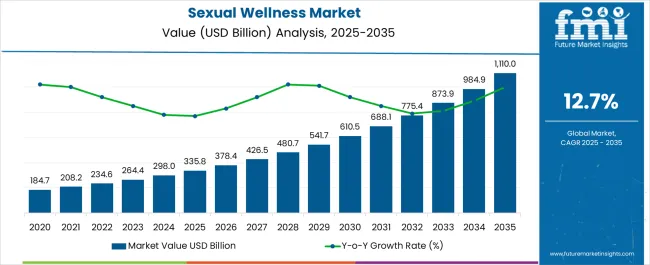
| Metric | Value |
|---|---|
| Sexual Wellness Market Estimated Value in (2025 E) | USD 335.8 billion |
| Sexual Wellness Market Forecast Value in (2035 F) | USD 1110.0 billion |
| Forecast CAGR (2025 to 2035) | 12.7% |
The sexual wellness market is expanding at a steady pace. Growth is being supported by increasing awareness about sexual health, rising openness toward intimate products, and the influence of digital retail platforms that improve accessibility. Current dynamics are characterized by strong demand from younger demographics, higher acceptance of sexual wellness products as part of lifestyle choices, and growing emphasis on quality and safety standards.
Product innovation in materials and designs, along with greater marketing efforts, is enhancing consumer confidence and driving repeat purchases. The future outlook is influenced by continued social destigmatization, expansion of e-commerce penetration, and technological integration in product development.
Urbanization and rising disposable incomes are further reinforcing adoption across both developed and emerging markets Growth rationale is anchored on the sustained role of sexual wellness products in improving personal well-being, the ability of manufacturers to cater to diverse consumer needs, and the strength of established retail and digital channels, ensuring robust demand momentum in the years ahead.
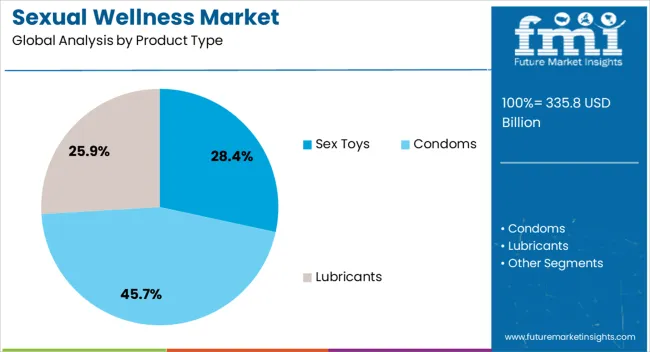
The sex toys segment, accounting for 28.40% of the product type category, has remained the leading product group due to its increasing adoption across both developed and emerging markets. Demand has been driven by evolving attitudes toward sexual health and the growing acceptance of intimate products as part of wellness routines.
Enhanced product innovation, including safer materials and technologically advanced designs, has strengthened consumer trust and usability. Expansion of online retail channels has facilitated discreet purchasing, boosting sales volumes across wider geographies.
Consistent demand from both individual and couple-oriented consumption patterns has sustained segment growth Future prospects are further supported by premiumization trends, where higher-value products with advanced features are capturing greater consumer interest, ensuring that the sex toys category continues to hold a dominant role in the sexual wellness market.
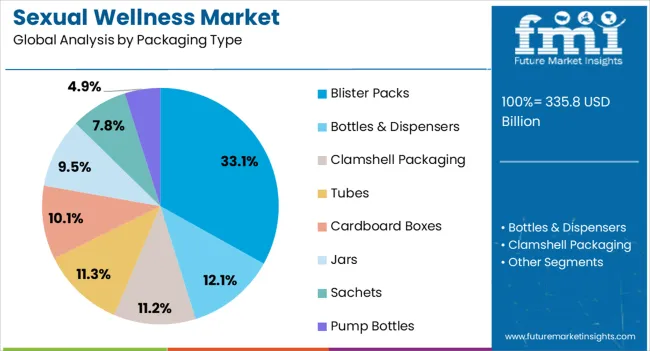
The blister packs segment, representing 33.10% of the packaging type category, has gained prominence due to its practicality, affordability, and ability to maintain product integrity. Blister packs are favored for their ease of handling, tamper evidence, and protective attributes, which ensure consumer confidence and compliance with safety regulations.
Adoption has been supported by wide applicability across lubricants, contraceptives, and small sexual wellness accessories, reinforcing demand from both retail and online sales channels. Cost-effectiveness and adaptability to mass production have further sustained the packaging choice, enabling scalability for manufacturers.
As consumer expectations evolve toward safety and hygiene, blister packs are expected to maintain their leadership position, benefiting from regulatory alignment and continued demand across diverse product lines within the sexual wellness market.
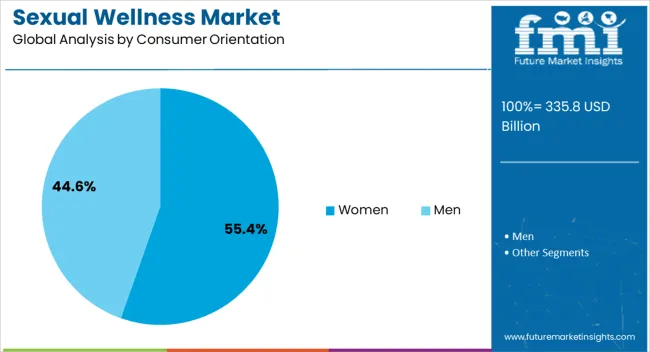
The women segment, holding 55.40% of the consumer orientation category, has emerged as the dominant demographic, reflecting the rising focus on female sexual wellness and empowerment. Market demand has been strengthened by increased awareness campaigns, product lines specifically designed for women, and the active role of digital platforms in creating open conversations about female intimacy needs.
Adoption has been supported by discreet online purchasing options, premium product innovations, and greater availability of educational content. Manufacturers have been tailoring offerings to align with female-centric preferences, including design aesthetics, safety standards, and wellness positioning.
Growth has also been driven by social shifts toward destigmatization and rising disposable incomes among women in both developed and emerging economies This trend is expected to reinforce long-term demand, ensuring that women remain the leading consumer group shaping the future direction of the sexual wellness market.
Changing Social Norms and Cultural Preference
Changing social norms and cultural perspectives have become a driving force in the sexual wellness market. In recent years, the way society views and talks about sexuality has shifted, becoming more open and accepting. Millennials are increasingly embracing the idea that sexual well-being is an essential aspect of their health and happiness.
The significant change in attitude has led to a growing demand for products and services that cater to sexual wellness. This includes items such as sexual health education, contraceptives, sex toys, and sexual health supplements.
As people feel more comfortable discussing and exploring their sexual needs and desires, the market for these products and services continues to expand. This is projected to reflect a broader recognition of the importance of sexual well-being in one’s life.
Health and Wellness Awareness among Modern Consumers
Health and wellness awareness among today’s consumers is playing a crucial role in driving the sexual wellness market. In recent times, people have become more conscious of their overall well-being, and this extends to their sexual health.
There is, hence, a growing demand for products and services that promote sexual wellness, such as contraceptives, sexual health education, and intimate products. This heightened awareness has led to an increased focus on safe and pleasurable sexual experiences, which, in turn, is fueling innovation in the sexual wellness market.
Consumers are seeking out products that are not only effective but also safe and free from harmful chemicals. This trend is driving companies to develop more natural and organic options.
The destigmatization of discussions around sexual health and wellness has also empowered individuals to take control of their sexual lives and seek products that cater to their specific needs. This growing consumer awareness and desire for a healthier and more satisfying sex life are propelling the sexual wellness market to new heights.
Youngsters to Look for New Products with Rising Education
Adequate sexual education for young people plays a vital role in pushing the sexual wellness market. It empowers younger sections of the population with essential knowledge and skills to make informed decisions about their sexual health and relationships.
Advanced education further helps reduce the stigma and misconceptions surrounding sexual topics, fostering a more open and accepting society. As a result, there is an increased demand for sexual Wellness products and services, such as contraceptives, sexual health checkups, and intimate care products. This is because young individuals prioritize their well-being and seek ways to maintain healthy, satisfying relationships.
The global sexual wellness market witnessed a CAGR of around 12.3% in the historical period between 2020 and 2025. It is estimated to register a considerable CAGR of 12.7% in the projection period from 2025 to 2035.
| Historical CAGR (2020 to 2025) | 12.3% |
|---|---|
| Forecast CAGR (2025 to 2035) | 12.7% |
The global sexual Wellness market saw steady growth, driven by increasing awareness about sexual health and a growing emphasis on personal well-being. Products such as condoms, lubricants, and sexual health supplements gained popularity, with a focus on safe and enjoyable intimate experiences.
The market, however, experienced limitations, such as social stigma and lack of comprehensive education. In the forecast period from 2025 to 2035, the market is set to expand significantly due to the increased acceptance of sexual wellness as an integral part of one’s health and lifestyle.
Innovative technologies, including smart sex toys and digital sexual health platforms, are set to revolutionize the industry, offering consumers A broader range of options. Moreover, greater education and open discussions about sexual health are expected to fuel the market growth.
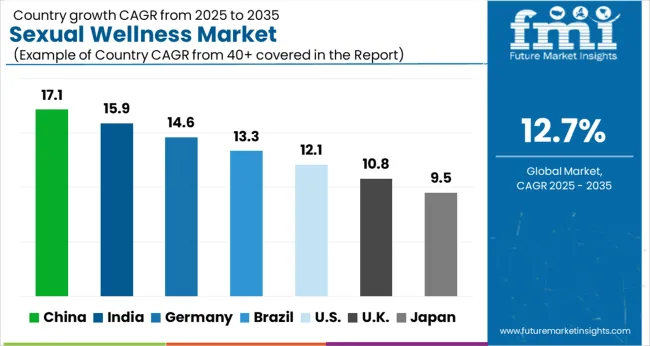
The section below brings to the fore key highlights of the sexual wellness market across prominent countries. Out of all the countries profiled, the market in the United States will likely accumulate a CAGR of 7.4% from 2025 to 2035. It is set to be followed by China at 10.6%. The United Kingdom, India, and South Africa are estimated to witness CAGRs of 10.5%, 13.4%, and 16.6%, respectively.
| Countries | Value-based CAGR (2025 to 2035) |
|---|---|
| United States | 7.4% |
| China | 10.6% |
| United Kingdom | 10.5% |
| India | 13.4% |
| South Africa | 16.6% |
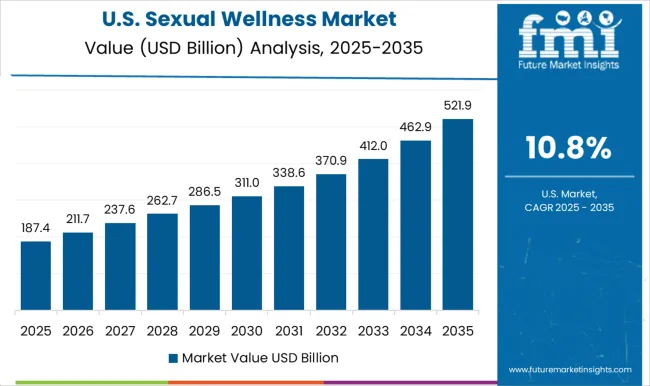
The introduction of innovative sexual wellness products and services has transformed the industry landscape and consumer experiences in the United States. With a growing focus on sexual health, well-being, and destigmatization, companies present in the country have been investing heavily in research and development. They are aiming to create cutting-edge products, including advanced contraceptives, intimate hygiene solutions, and pleasure-enhancing devices.
The rise of digital platforms and telemedicine services has also facilitated easy access to expert advice, personalized consultations, and discrete purchasing options. These facilities foster a more open and informed dialogue around sexual health.
The wave of innovation not only meets the evolving needs and desires of consumers but also contributes to the market’s rapid expansion. It is further anticipated to cater to diverse demographics and preferences across the United States.
China is anticipated to rise at a CAGR of 10.6% in the global sexual wellness market during the forecast period. This is due to the presence of top manufacturers of several types of sexual toys as well as the availability of these products in the market.
China is known for its superior manufacturing capabilities, and this extends to the production of a wide range of items, including sex toys. Manufacturers in China have the expertise and technology to produce high-quality products, which makes it possible for them to create high-end sexual toys. A handful of manufacturers have developed reputable brands known for their premium-quality sexual toys.
E-commerce platforms in China have made it easier for consumers to access a wide variety of products, including sex toys. This has helped increase the visibility and availability of high-end products, which would directly impact the growth of the sexual wellness market.
India is expected to surge at a CAGR of 13.4% in the global sexual wellness market during the evaluation period. This is due to the rising awareness of sexual health and a growing demand for safe and high-quality products.
Millennials are becoming more informed and proactive about their sexual health, leading to a greater acceptance of products that enhance sexual pleasure. They are also looking for new products that can provide protection and address multiple intimate health concerns.
The market is also witnessing an expansion in the range of products and services offered, including contraceptives, lubricants, sexual wellness supplements, and sexual health clinics. Manufacturers and retailers are responding to this demand by offering innovative and medically approved solutions, contributing to the market’s robust growth.
The United Kingdom is projected to register a decent CAGR of 10.5% during the forecast period in the sexual wellness market. The rising demand for condoms and lubricants in the country is projected to drive sales.
The rising awareness of sexual health and safe sex in the United Kingdom is set to aid demand. The government will also likely take educational initiatives and create public health campaigns to surge knowledge about the complications of unprotected sex. This is further expected to lead to a high emphasis on responsible sexual behavior.
Condoms are anticipated to be an immensely popular choice of contraception as these are available in drug stores and are affordable. With the emergence of several online platforms and dating applications, millennials are expected to look for non-committal relationships and casual encounters. This trend is projected to enable individuals to focus on protection, making lubricants and condoms significant elements for safe sexual experiences.
South Africa is anticipated to witness an astonishing CAGR of 16.6% in the sexual wellness market through 2035. South Africa is a country with a diverse and rich cultural heritage. Hence, open conversations about sexual pleasure and health are gaining impetus. This changing attitude is expected to drive the need for sexual wellness products to break the challenge of taboos associated with sex.
The surging cases of sexually transmitted infections (STIs) such as HIV/AIDS in South Africa are likely to augment the demand for sexual wellness products. The demand for condoms is anticipated to skyrocket to reduce the risk of STIs.
According to the National Institute for Communicable Diseases, in 2020, around 184.7 million people were living with HIV in South Africa. About 2.3 million fresh cases of gonorrhea, 1.9 million new cases of chlamydia, and 23,175 new cases of syphilis among women between the ages of 15 and 49 occurred in 2020.
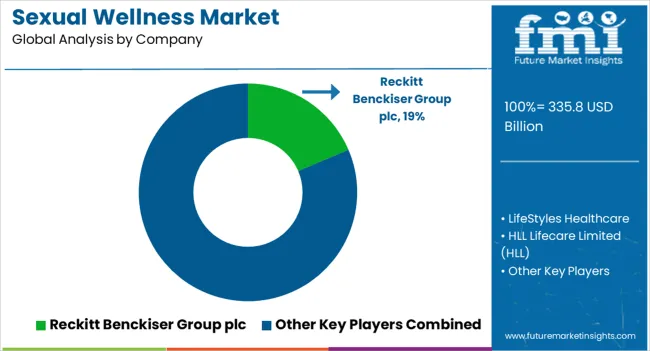
Keep less operating in the global sexual wellness market are actively focusing on investment in research and development. They aim to create innovative sexual wellness products that are safe, effective, and cater to a diverse range of consumer preferences.
For instance,
In October 2025, three new sex toys from sexual wellness company Durex were released. These are meant to help people have the most fun possible, whether they're playing alone or with partners, regardless of the situation. These new products are the Deep & Deeper anal plug, the Slide & Ride sleeve, and the Vibe & Tease vibrator.
In May 2025, the delectable collection by gender-neutral sexual wellness business nauox was launched. The lubricants and trademark wash from nauox, which tap improved flavor characteristics, have names such as Dulce Dreams, Muesli Honey, and Agave Nectar.
In May 2025, the first vegan condom brand in India, Bleü, was acquired by Sirona. The latter is a personal hygiene company based in India. This represents the brand's entry into India's rapidly expanding sexual wellness market.
| Attribute | Details |
|---|---|
| Estimated Sexual Wellness Market Size in 2025 | USD 296,286.6 million |
| Projected Sexual Wellness Market Size in 2035 | USD 981,047.8 million |
| Value-based CAGR from 2025 to 2035 | 12.7% |
| Forecast Period | 2025 to 2035 |
| Historical Data Available for | 2020 to 2025 |
| Sexual Wellness Market Analysis | Value (USD million) |
| Key Regions Covered in the Sexual Wellness Market | North America; Latin America; Europe; East Asia; South Asia; Oceania; and the Middle East & Africa |
| Key Countries Covered in the Sexual Wellness Market | United States, Canada, Brazil, Mexico, Argentina, Germany, United Kingdom, Spain, France, Italy, Russia, Benelux, China, Japan, South Korea, India, Thailand, Australia, GCC, South Africa, and the rest of the world |
| Key Segments Covered in the Sexual Wellness Market | Product Types, Packaging Type, Consumer Orientation, Distribution Channel, and Region |
| Key Companies Profiled in the Sexual Wellness Market | LifeStyles Healthcare; HLL Lifecare Limited (HLL); Church & Dwight; Bijoux Indiscrets; Reckitt Benckiser Group plc; LELO; Doc Johnson Enterprises; Lovehoney Group; Okamoto Industries Inc.; Karex Berhad; Humanwell Group; Mankind Pharma; Others (As per Request) |
| Sexual Wellness Market Report Coverage | Market Forecast, Company Share Analysis, Competition Intelligence, Market Dynamics and Challenges, and Strategic Growth Initiatives |
The global sexual wellness market is estimated to be valued at USD 335.8 billion in 2025.
The market size for the sexual wellness market is projected to reach USD 1,110.0 billion by 2035.
The sexual wellness market is expected to grow at a 12.7% CAGR between 2025 and 2035.
The key product types in sexual wellness market are sex toys, vibrators, dildos, anal toys, penis rings, male masturbators, couples' toys, bdsm and bondage toys, condoms, latex condoms, non-latex condoms, lubricants, water-based lubricants, silicone-based lubricants, oil-based lubricants, female contraceptives (otc), sexual wellness supplements (otc), intimate hygiene products, intimate washes and cleansers, intimate wipes, intimate moisturizers, hAIr removal products and intimate deodorants.
In terms of packaging type, blister packs segment to command 33.1% share in the sexual wellness market in 2025.






Full Research Suite comprises of:
Market outlook & trends analysis
Interviews & case studies
Strategic recommendations
Vendor profiles & capabilities analysis
5-year forecasts
8 regions and 60+ country-level data splits
Market segment data splits
12 months of continuous data updates
DELIVERED AS:
PDF EXCEL ONLINE
UK Sexual Wellness Market Trends – Size, Share & Innovations 2025-2035
USA Sexual Wellness Market Analysis – Trends, Innovations & Forecast 2025-2035
GCC Sexual Wellness Market Analysis - Demand, Growth & Forecast 2025-2035
Japan Sexual Wellness Market Insights – Growth & Demand 2025-2035
Germany Sexual Wellness Market Report – Demand, Trends & Industry Forecast 2025-2035
Sextech and Sexual Wellness Market Size and Share Forecast Outlook 2025 to 2035
Sexual Enhancement Supplements Market Analysis – Trends & Forecast 2025 to 2035
Sexually Transmitted Diseases (STD) Diagnostics Market Analysis by Laboratory Devices & Point of Sales Through 2034
Wellness Tourism Market Report – Growth & Demand 2025 to 2035
Wellness Services Market Trends - Growth & Forecast 2025 to 2035
Global Pet Wellness Services Market Analysis Size and Share Forecast Outlook 2025 to 2035
Corporate Wellness Solution Market Size and Share Forecast Outlook 2025 to 2035
Corporate Wellness Software Market Size and Share Forecast Outlook 2025 to 2035
Probiotic Wellness Drinks Market Size and Share Forecast Outlook 2025 to 2035
Workplace Wellness Market Size and Share Forecast Outlook 2025 to 2035
Beauty and Wellness Market Size and Share Forecast Outlook 2025 to 2035
Health and Wellness Product Market Analysis – Size, Share, and Forecast 2025 to 2035
Health and Wellness Foods Market – Growth, Demand & Forecast 2025-2035
Thermal Spa and Wellness Market Size and Share Forecast Outlook 2025 to 2035
Digital Therapeutics and Wellness Market Size and Share Forecast Outlook 2025 to 2035

Thank you!
You will receive an email from our Business Development Manager. Please be sure to check your SPAM/JUNK folder too.
Chat With
MaRIA